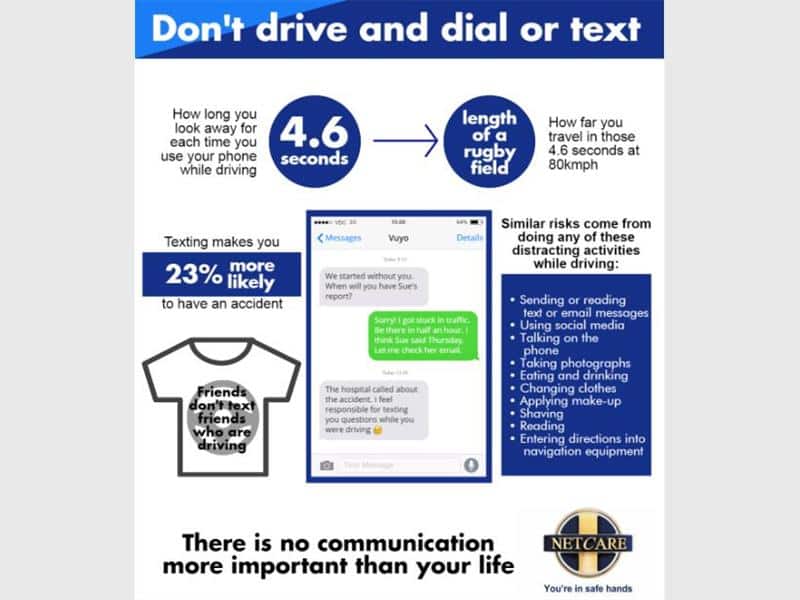
WHILE a great deal of emphasis is placed on the dangers of drunken driving in South Africa, and rightly so, texting and driving, as well as other forms of distractions while on the road, can be every bit as hazardous.
“The impairments associated with drunken driving and texting while driving has much in common, and both are illegal in South Africa as well as exceedingly perilous activities” said Netcare’s general manager, Mande Toubkin.
It is not possible at present to establish how many motor vehicle crashes in South Africa may be related to distracted driving, which may include using a mobile phone or other technologies while on the road. However, it is becoming a leading cause of road accidents in this country, where a staggering one million motor vehicle accidents were reported to the South African Police Service in 2015.
“We certainly have many patients who are admitted to Netcare’s emergency departments who report that their vehicle accidents were related to one or other form of diversion while they were at the wheel,” said Toubkin.
According to the National Highway Traffic Safety Administration in the United States, texting while driving distracts the driver from the road for an average of 4.6 seconds and increases the chances of an accident by a massive 23 per cent.
The Automobile Association (AA) undertook a survey in which it observed that during a typical traffic peak morning, 7.2 per cent of 2 500 drivers were actually holding and using their mobile phones while driving.
“There is a growing body of evidence that shows that the distraction caused by mobile phones or other technologies can impair driver performance and competence in a number of ways, including delayed reaction times, and an impaired ability to keep in the correct road lane and maintain safe following distances. If what you are doing causes you to either take your eyes off the road, one or both hands off the steering wheel, or your mind off the road, you are placing yourself and other road users at risk,” said Toubkin.
Netcare’s trauma programme manager, Rene Grobler says it is a misconception that using a hands-free mobile phone kit comes without risk. “Drivers talking on their mobile phones, either hand-held or hands-free, are all at an increased risk of having an accident because they are trying to dial or take calls, or may simply be cognitively distracted by conversation. As modern neuroscience is showing, the human brain is simply not able to efficiently deal with too many activities simultaneously,” she said.
Grobler urges those who engage in the following kinds of activities while on the road, to consider the risks and to desist from any activities that may impair their concentration:
*Texting or using a cellphone
*Talking on the mobile phone without a hands-free device
*Talking for long periods of time even using a hands-free device
*Using in-vehicle technologies such as navigation systems and CD players
*Reading a map, newspaper or other media
*Taking photographs
*Taking your eyes off the road to talk to passengers in the car
*Changing clothes
*Grooming
*Eating and drinking (hot and messy foods may be especially problematic)
*Searching for a cigarette lighter, lighting a cigarette, or smoking
Safety is far more important than that call you feel you may need to take, or the email or message you want to check. Rather turn off your phone and put it away in your boot or glove-compartment whenever you drive, so that your attention stays on the road. It is critical to focus fully on the road. If you absolutely have to do something that is going to distract you, rather pull over to a safe place,” she said.







